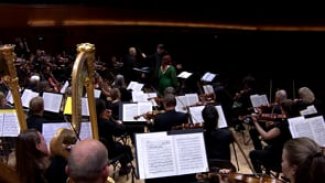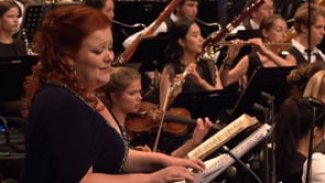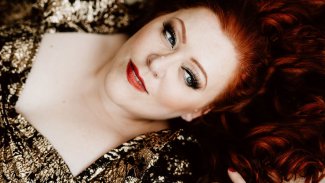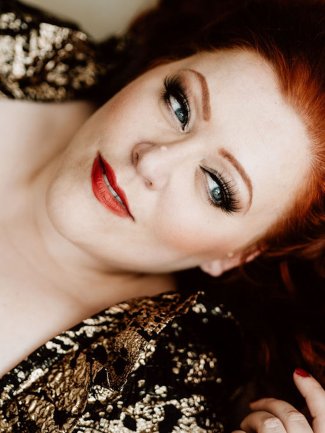
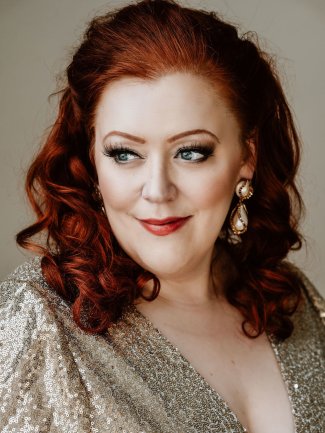
Miina-Liisa Värelä
“Miina-Liisa Värelä is currently proving to be one of the most promising sopranos in the dramatic field and is increasingly appearing on the larger opera stages.”
(Opernmagazin, March 2022)
Making her debut at 2025 Bayreuther Festspiele as Ortrud (Lohengrin) “Miina-Liisa Värelä was the standout voice of this performance — her vocal power seems limitless. Her performance full of energy and contrast, and her stage presence was intensely dramatic.”
—Resmusica.
Building a strong profile in the German dramatic repertoire, Miina-Liisa Värelä is a sought-after interpreter of Die Färberin (Die Frau ohne Schatten), a role she performed most recently in landmark new productions at Festspielhaus Baden-Baden under Kirill Petrenko and Berliner Philharmoniker, and at Semperoper Dresden under Christian Thielemann. Now established as a leading Wagnerian, Värelä has also garnered tremendous acclaim as Isolde (Tristan und Isolde) with Los Angeles Philharmonic Orchestra under Gustavo Dudamel, and at both Glyndebourne Festival Opera and BBC Proms under Robin Ticciati.
See more
Värelä’s 2025/26 season is no less impressive. It includes her anticipated debut as Brünnhilde (Die Walküre) first in concert with Accademia Nazionale di Santa Cecilia under Daniel Harding in Rome, before bringing the role to the stage in Tobias Kratzer’s new production at Bayerische Staatsoper under Vladimir Jurowski, which will include the full Ring Cycle in the coming seasons. She also returns to Oper Frankfurt as Isolde under Thomas Guggeis, and continues her celebrated new association with Bayreuther Festspiele as Kundry (Parsifal) under Pablo Heras-Casado. In concert, she joins Orchestre de Paris and Daniel Harding as Sieglinde, and London Philharmonic Orchestra and Robin Ticciati in Sibelius’ Kullervo.
Operatic triumphs of recent seasons include her debut as Leonore (Fidelio) with Canadian Opera Company under Johannes Debus, the title role in Ariadne auf Naxos and Ortrud (Lohengrin) at Gran Teatre del Liceu under Josep Pons, Elektra at Landestheater Linz and Die Färbering at Bayerische Staatsoper, Oper Frankfurt and at the Verbier Festival. At Finnish National Opera, where she debuted as Turandot, she recently paid tribute to Aulis Sallinen as Anna in a new production of Ratsumies under Hannu Lintu, and she sang her first Tosca on the stage of the Savonlinna Festival, conducted by Lorenzo Passerini.
A native of Finland, Värelä is a graduate of the esteemed Sibelius Academy and a laureate of competitions including Lappeenranta and Belvedere. She is a regular presence on the concert platform with a repertoire including works like Shostakovich, Symphony No.14, Wagner, Wesendonck Lieder and Strauss, Vier letzte Lieder, marking her as a soprano of rare artistry and formidable presence.
Contacts
Shirley Thomson Senior Director, VOICE at HarrisonParrott | Head of CSR
General Management
General Management
Gallery
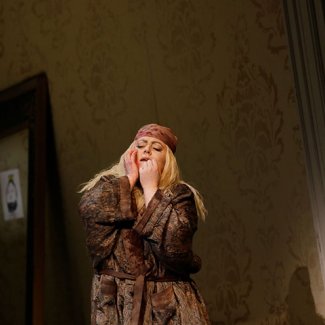
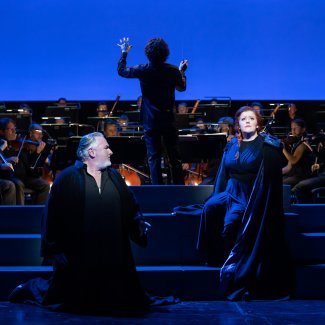
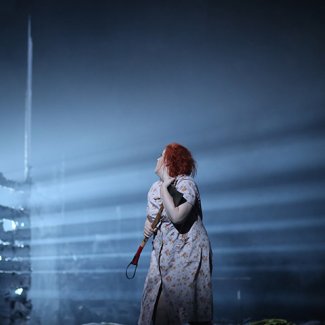
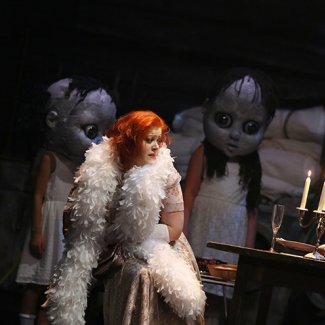
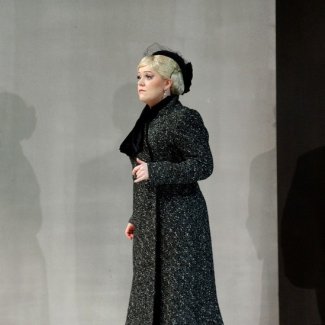
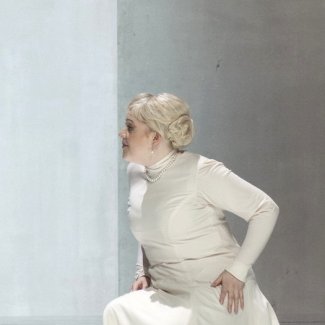
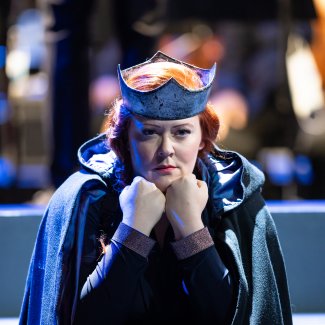
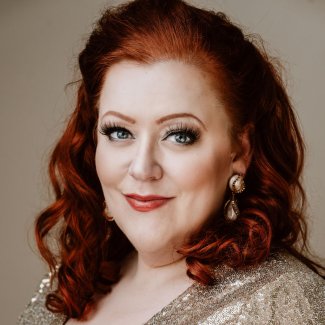
“[Värelä] exceeds all expectations in a performance that is sure to be talked about for years to come…Her rich, even tone is coupled with textbook Wagnerian top notes reminiscent of the great Birgit Nilsson, and the surety of her attack is remarkable”
“Varela makes a magnificent impact with her rich, dramatic soprano and acting skills. Her long duet scene with O’Neill is the cream on the cake of the whole opera”
“Miina-Liisa Värelä has a voice that impresses. The ease with which this Sieglinde holds the arc of her story taut (“Der Männer Sippe”), the nuances she instils in her lines to her twin brother, and finally the naturalness of the delivery, command admiration.”
“Miina-Liisa Värelä was the standout voice of this performance — her vocal power seems limitless. Her performance full of energy and contrast and her stage presence intensely dramatic.”
“Värelä shows her strength with powerful, almost demonic tones that can also shimmer with seduction and menace. She is completely convincing in both sound and stage presence.”
“Miina-Liisa Värelä is very good as the premiere Ortrud with brilliant top notes and an intense, vengeful performance; impressive and confident.”
“Miina-Liisa Varela, a very convincing Isolde. Her voice effortlessly filled the difficult acoustics of De Doelen. She also moved most convincingly through the staged play of light on stage, with a single look she was able to evoke an entire atmosphere”
“Miina-Liisa Värelä sang with full bodied authority, having rich, creamy tones… Her final “Liebestod” […] was particularly moving and impressive.”
“Miina-Liisa Värelä as Isolde was pearly-voiced and intimate in a way one rarely hears in this role.”
“Blessed with an impressive soprano voice that is confident and slender right up to the highest notes, Värelä is also a magnificent actress who credibly traces the development from the initially gruff chain smoker from the working class to an empathetic, loving wife.”
“Her portrayal of the Dyer’s Wife with a soprano voice full of warmth and empathy is a pleasant addition to the young human woman who is often characterized as nagging — and so misunderstood. Värelä managed to put all the emotions of disgust and despair, but ultimately also love and affection, into the beautiful sound of her voice.”
“Miina-Liisa Värelä was superb as his wife, singing generously with bright, dramatic tone and bringing plenty of wit and humanity to the role.”
“Sensual, haughty and above all very sensitive, the Finnish soprano asserts her character. In full vocal deployment, the generosity and vibrato of the singer are coated in an almost velvety liquid.”
“Miina-Liisa Värelä’s Isolde seduces with an attractive timbre, solid singing, defined nuances, and clear expressiveness.”
“Värelä is a bulwark of strength as Leonore, possessing an incandescent voice that vibrantly enlivens the colourful score.”
“Miina-Liisa Värelä was a fierce, piercing Isolde, on fire from the start.”
“Miina-Liisa Värelä as the Dyer’s wife is sensational, with sparkling top tones, a warm middle register and great depth.”
“Miina-Liisa Värelä as the Dyer’s wife enchants with her lyrical timbre and dramatic abundance.”
“Dramatically and vocally, Miina-Liisa Värelä as Ortrud is so outstanding that you almost feel more drawn to evil than to the supposedly good.”
“Miina-Liisa Värelä celebrated her house debut at Oper Frankfurt in the role of the Dyer. She is currently proving to be one of the most promising sopranos in the dramatic field and is increasingly appearing on the larger opera stages”
“Her beautiful voice, which is particularly pronounced in the high notes, did not appear particularly dramatic at first, but increased in the course of the opera to a volume and depth of penetration that was second to none.”
“In Värelä, a Dyer was finally found who created a role portrait entirely in the spirit of the composer. She embodied a vocally young, misunderstood woman full of dreams and passions and not the drooling, unsympathetic Dyer’s wife, as one hears so often elsewhere.”
“She already presents an assured and rounded version of the character [Isolde], both vocally and in her movement. Apart from raw power and impressive stamina, she brings many vocal nuances to a role that, all too often, singers mainly survive rather than shape.”
“Her assured lower register can compete with many mezzos for its intensity and core; she also deployed a clean, straight tone at moments of icy focus and resolve, especially in Act one. This kind of vocal control makes the backstory delivered in Act one compelling. Her entry in Act three, tending to the fallen body of Tristan, was heart-stoppingly tender.”
“The soprano Miina-Liisa Värelä led the listener with flexible vocal colouring and a large dynamic range”
“The Finnish soprano Miina-Liisa Värelä was top-class and at the same time a competent interpreter of the vocal part…[she was] able to utter words of thunder with all Russian texts, but also to articulate the bitterly evil and the hopeless quietly and clearly”
“A flexible, highly dramatic soprano, Värelä took this up with a wealth of nuances and was responsible for the finely chiselled drama”
“Värelä has developed into an exquisite lyric-dramatic soprano whose sustained sound flows freely, with fresh, beautiful silvery lines.”
“Mina-Liisa Värelä (replacing the expected Nina Stemme) is an excellent Tintora, more lyrical than dramatic, more sarcastic than afflicted, of great vocal security, capable of nuances and of a remarkable variety of colors on the whole range.”
“Nina Stemme was replaced by the Finn Miina Liisa Värelä as a dyer. She recently celebrated a great success as Elektra at the Landestheater in Linz. Her clear height without sharpness impresses, just as the force of her voice, which she understands colorfully to tame.”
“Miina-Liisa Värelä plays an extraordinary dyer. The voice is frank, the delivery powerful, the richness of timbre obvious.”
“Then there was the cast, which made it possible to discover voices that will surely be seen on the great operatic stages – one especially, that of the soprano Miina-Liisa Värelä.”
“Miina-Liisa Värelä was the excellent surprise of the evening, delivering an undecided Dyer, hesitating between meanness and arrogance, but ultimately moving and human, and also very expressive by the fiery glances she never stopped throwing at her poor husband.”
“We could not have found a better pair than John Lundgren’s Barak and Miina-Liisa Värelä’s Dyer.”
“His wife was played by dramatic soprano Miina-Liisa Varela. Like Magee she rose to Strauss’ vocal challenges with apparent ease, and produced an accomplished performance. She displayed wonderful upper register, which was firmly grounded, and was able to soar effortlessly above the orchestra, without any loss of quality. However, she not only possessed power, but also the necessary delicacy, and a pleasing legato.”
“An Elektra of steely power, noble strength … a voice in peak health, technically sound … with floating pianissimos in the dialogue with Klytämnestra”
“Miina-Liisa Värelä, in the role of Sieglinde, harvested the evening’s greatest applause. She sang with power, clear and nuanced, and with a lovely edge to the voice.”
“Miina-Liisa Värelä dominated everything as Färberin with her full and dramatic soprano.”
“The young Finnish soprano Miina-Liisa Värelä sang a psychologically nuanced and musically perceptive Dyer’s Wife. With her full, rounded voice, she brought youthful impetuousness to the powerhouse role.”

